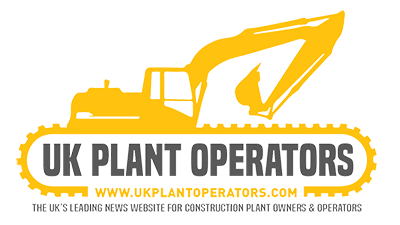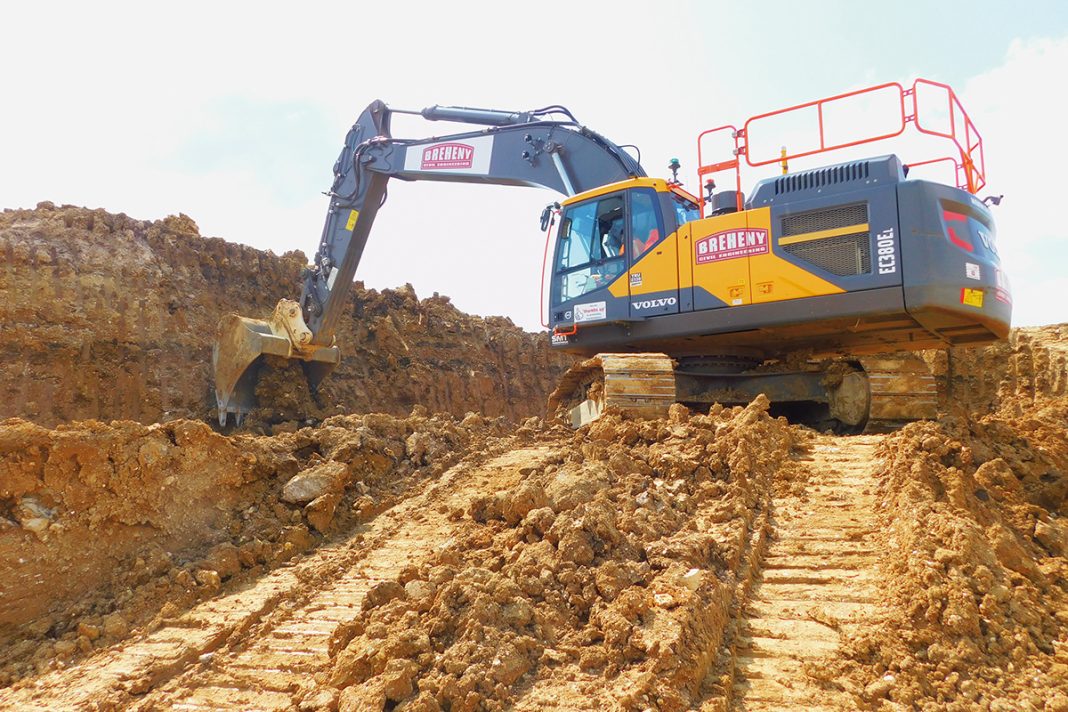![]()
We were pleased to receive an invite from renowned contractor Breheny Civil Engineering to visit their Bishops Stortford North site.
The company who are celebrating 60 years in the industry this year, are building 3 kilometres of new road with all the associated drainage. Meaning they will be shifting 500,000 Cu m of earthworks and building 3 cast-insitu concrete bridges over a watercourse. The project is well under way with an expected completion for this phase by the end of the year.
The Project
We spoke with Project Manager Chris Mitchell who told us more about what the project entails. The plan is to build the infrastructure for four housing developers, so lots of storm and fell drainage to feed all the development paths. With earthworks taking up to 250,000 Cu m of muck away.
The installation of foot bridges and Bailey Bridges will complete this infrastructure project. The job started in June 2022 and will end in December this year. The first house in fact will start construction in late May with a likely occupier taking up residency this September.
Fantastic Five
Breheny have in fact entered a team of five, for this years UK Plant Operator of the Year campaign, so we were keen to meet with one of the Operators who was on site, we wanted to have an in-cab conversation about the tech the company is employing, how these connected assets are supporting the business and helping the operator.
We understood that Breheny have had a Volvo EC350E Hybrid excavator on trial, so we wanted to understand, from the Operators perspective, how the machine performance differed from a diesel machine.
Then finally we chatted to the company’s Business Development Manager Steve Dighton, about what it is that attracts Breheny to the UK Plant Operator of the Year campaign and their plans for this year’s event.
The Sun has Got Its Hard Hat On.
With the Sun out, the machines hard at work we ventured on to site. This was not my first rodeo; however, I was pleased that for the first time, I was joined my son Joe. Joe handed in his dissertation at Nottingham Trent University just last week. Completing a media production course, so with several documentaries already under his belt, he left the world of Drum and Bass and seamlessly entered the world of Diggers and Dumpers.
So, with camera in hand, notebook ready for edit pointers, Joe and I headed out to meet Breheny Plant Operator Simon Hutchings.
My Name is ‘Hutch’ (Video 1)
Simon Hutchings from here on in, and at his insistence asked that we called him ‘Hutch.’ Hutch was a welcoming individual, who was happy to talk and happy to talk on camera, the job (you will see by clicking the QR code) he did with great aplomb.
Hutch who has served Breheny for a quarter of a century, was in the cab of his Volvo EC380E, during his 25-year service there have clearly been many changes, so we started by asking what devices were in the cab that were helping him today.
The GPS unit being used was a Trimble unit that Hutch described as priceless and in his opinion was one of the easiest to use…. Find out why in the video.
It was interesting to listen to Hutch as he described how his role has changed in as much as, with the data and information available to him, he can now, in a proactive way, suggest job scheduling and sequencing for example.
When ground conditions are poor look at alternative task that can be undertaken to further improve productivity. Equally when an area needs to be built up, the Trimble GPS device gives accurate information of the nearest place to track over to, where the excess spoil can be taken.
With less time wasted, less time waiting and less waste this all makes Hutch so much more self-sufficient, increasing his value and indeed self-worth.
Thinking back to when Hutch first started to use GPS he was clear that there was no apprehension, only good could come from it he said and indeed that certainly appears to be the case.
The middleman has gone, on-site communications are simplified and consistent…the plan for the day can be adapted by any changes that invariable occur meaning up time is fully optimised.
Watch the In Cab Conversation with Hutch in full and see him in action by scanning the QR code here.
VOLVO EC380E: Machine Overview (Video 2)
Now out of the Cab, we wanted to know more about the machine Hutch was operating, his relationship with the machine and the Hybrid excavator that he had been trialling.
The feedback on the machine, a Volvo EC380E was really positive, with Hutch describing it as a ‘fantastic machine’. This was quantified by the amount of power the machine delivers, ripping the ground open in the most efficient of ways. With no reported trouble via breakdowns and stoppages this again was a real positive.
It was indeed a ringing endorsement of the machine and brand, given that he had spent two years exclusively operating. This practice being a preferred Breheny methodology, for their more experienced operators as the relationship further enhances performance, reputation and engagement, from the company’s team of operators.
Hutch went on to explain how seamless the transfer to new sites is, as the site manager will issue a simple memory stick or a remote digital issue of all the site coordinates. These are then inserted into the GPS to enable a slick and efficient start to any new site, project or job.
We went on to discuss the recent trial of a Hybrid Volvo Excavator EC350 Hybrid. Hutch was selected by Breheny to operate the machine and report back on its progress.
Again, there seemed nothing but praise for the unit, with an instant recognition of the Hybrid machines economy even when compared to the larger Diesel EC380E.
A good example Hutch gave was that under normal site operations the diesel EC380E machine would use around 28-29 litres an hour. When Hutch transferred to the Hybrid machine, the same size bucket was fitted so the comparison would be fair, the fuel use dropped to 16-17litres an hour.
All from an engine that is half the size in output of the larger diesel EC380E. Resulting in an equally good performance, with the view from the cab being that it was hard to tell which machine he was operating, with what seemed to be the same amount of power and performance even with the 1.9m digger bucket.
So, in summary the view from site was a definite benefit by consuming less fuel, burning less fuel and producing fewer emission, let’s leave the last line to Hutch…” It’s the future, the way the world needs to go”.
Breheny the Team to Beat. (Video 3)
Breheny have for the past two years entered a team that best represents the talent of Plant Operators the company employs.
In the first UK Plant Operator of the Year Breheny had the runner up in Mark Jarman, then last year they went one better when Hannah Jarman, daughter of Mark and Plant Operator extraordinaire, won and became the first women to take the title.
The field is open, Breheny are entering a team of five, so we asked Breheny Business Development Manager Steve Dighton why Breheny enter a team in the annual campaign.
Steve replied “We enter our plant operators so they can pit their skills against the best the market can offer. We feel it demonstrates to our team of operators that we back them and you must be the best to work for Breheny. Then at the end of the day, it’s a fun thing to do, testing ourselves against other contractors, hirers and owner operators”.
Steve concluded “We want to retain out title we won and we are delighted to say that the UK Plant Operator of the Year, is part of the Breheny team. We have picked another strong team for this year’s event and we are in it to win it.”























